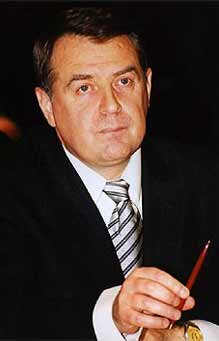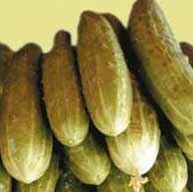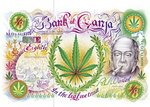[13.05.2005]
What is the threat of hemp, or the story of several misunderstandings
Cannabis is burned in Mexico. In many countries, cannabis is considered a drug and will be for a long time to come.

The heated debate over marijuana legalization, which has been going on for nearly a century, usually comes down to one question: Is cannabis different from other drugs?
Is it less harmful, or is marijuana essentially no better than heroin or some other synthetic nastiness that causes instant and permanent addiction?
Oddly enough, people who have ever smoked "weed" and have not switched to other drugs claim that tobacco and alcohol are much more harmful. And not only to themselves, but to others as well.
And this is confirmed by statistics. About 90% of so-called domestic crimes are related to excessive alcohol consumption. And although, of course, everything depends on the person, too many are inclined to go wild from excessive alcohol consumption.
Alcohol is completely legal here.

The thing is that long-term alcoholics lose not only their human appearance, but also their internal restraints on aggression. Understanding their own brutality and self-abasement only leads to the desire to humiliate, offend or beat someone else, so to speak, put them on the same level as themselves.
The result is drunken fights, axe-waving, murders accompanied by the clink of vodka bottles and other "delights".
Marijuana, as has been repeatedly proven, not only does not contribute to aggressive behavior, but even, on the contrary, relaxes, calms and makes a person more peaceful.
In addition, cannabis does not contain nicotine. Although the harm from inhaling smoke is the same as in the case of cigarettes.
However, many doctors, especially here in Russia, prefer to adhere to the point of view that marijuana is no less harmful than tobacco or alcohol.
In this regard, the article published on the website is indicative.
Doctor.ru
answer to a question about the harm of cannabis from narcologist Vladimir Ivanov, chairman of the commission on narcology of the Council of Entrepreneurs of the Moscow City Hall, president of the All-Russian Union "Russia without Drugs".
In fact, the person who asked the question himself admitted that he uses "weed", so he was concerned about whether smoking affects
hashish
on the cardiovascular system in the same way as tobacco? And isn't vodka more harmful than cannabis?
It is characteristic that Vladimir Ivanov did not answer the question regarding vodka and tobacco, immediately moving on to the negative impact of cannabis (namely cannabis, and not just hashish) on the brain and to legal issues.
Here is his answer in full:
"I am happy for you, if you are asking questions about the harmfulness of cannabis, then not all is lost and everything is fine with your intellect. However, the possibility of its harmless use is quite limited.
In terms of individual harm, yes - intelligence and memory decline over time. Long-term depression and inability to withstand psychological stress occur. The greatest danger is that it is not possible to subjectively monitor these changes, and when a collapse occurs, alas, it is too late.
For quite a long time it may seem that nothing bad is happening, and if it starts, I will quit right away. You can see how difficult it is by trying to abstain from smoking marijuana for a long time.
The widespread opinion that cannabinoids do not cause addiction (tolerance) or physical (mental) dependence is, unfortunately, not entirely accurate, since it is based on subjective reports from feeble-minded smokers.
But here is an area that you have not even tried to look at. The acquisition and storage of drugs (cannabinol-containing) is prohibited by law and is punishable by criminal penalties. What is important is not only this, but also the fact that you regularly commit crimes.
Second: You cooperate (help) with the drug business, giving it your own or other people’s money, enriching it so that it can be swaggering, involving more and more new consumers, most often children.
Your attitude to these issues may allow you to more accurately and objectively assess the consequences of using marijuana and, of course, your moral and intellectual level."
This is said by a professional narcologist. He has probably handled many drug addicts, so he is, in theory, quite competent in this matter.
Why did he move with such haste to the question of criminal liability for the acquisition and possession of drugs?
Yuri Shevchenko, Minister of Health of Russia.

The fact is that on July 1, 2002, a new Administrative Code of the Russian Federation came into force, which provides for liability for the use of drugs without a doctor's prescription. "Thus," he said in an interview with the website
Narkotiki.ru
Russian Health Minister Yuri Shevchenko, a drug addict, became an offender under this code on July 1."
At the same time, abroad, in quite a few countries, there are “harm minimization” programs in place: in particular, free distribution of syringes to drug addicts, which, as journalists who collaborate with
Narkotiki.ru
, "is promoted by numerous Western non-governmental public organizations"; in Canada, the use of marijuana for medical purposes has been permitted since 1998, in Great Britain marijuana was decriminalized in July 2002. Only a little later than the introduction of the new Administrative Code in Russia.
All this is not done to hide the problem; These are not populist measures, they are the need to choose the lesser of two evils.
Without the need to waste time and energy on pot smokers, the police will be able (and obliged) to spend that time fighting heroin, cocaine and other poisons that are far more dangerous than even alcohol, tobacco and cannabis derivatives.
It is unlikely that British law enforcement officials themselves imagined that this was so. Taking into account British conservatism and the power of tradition, it is safe to say that this decision was preceded by long and difficult consultations with various specialists, including, of course, narcologists.
And by and large, the very sixth article of the Administrative Code smacks of much more populism:
"The use of narcotic drugs or psychotropic substances without a doctor's prescription, except for cases provided for in Part 2 of Article 20.20, Article 20.22 of this Code, shall entail the imposition of an administrative fine in the amount of five to ten minimum wages or administrative arrest for up to fifteen days."
Why is this populism? Firstly, there is a simplification of the problem: drug addiction, they say, is not a problem, but a guilt. Well, and besides, it is well known that in our country police officers, unfortunately, are forced to carry out
plan
by crime detection: a certain number of thefts, a certain number of murders, and a certain number of drug-related violations must be solved per month.
Thanks to this code, the formal difference between dealers who do not use drugs themselves, and are therefore doubly vile murderers, and marijuana smokers disappears.
It is enough to catch them with a joint, and the police will record a solved drug-related crime.

And therefore, any detective simply has no particular incentive to really fight the drug mafia. Two Rastafarians or a hippie with a joint are caught - and that's your solved crime rate.
Of course, this is a very simplified scheme, and it is not worth claiming that only those for whom reporting is more important than the actual fight against crime work in law enforcement agencies.
But there are also those who are only interested in the entries in the relevant documents, and there are many of them, and the sixth article of the administrative code seems to have been written especially for them.
In addition, we will cite the answer of the same Vladimir Ivanov to the question about criminal liability for drug use:
"This is reality. For the fact of drug use, recorded for the first time, administrative liability in the form of a serious fine will be introduced.
If you are detained again while under the influence of drugs, you will be charged with criminal liability not for the drug use itself, but for aiding the drug business by transferring money for the drug.
The evidence of the crime will be the confirmed fact of drug intoxication."
As can be seen, for Russian health and law enforcement officials the punitive route seems simpler and more acceptable; distinguishing and separating marijuana from heroin, for example, turns out to be completely unnecessary problems for them. This is a question of long-established principles and worldview.
What can – and do – opponents of this approach say?
Firstly, marijuana does not contain nicotine. Unlike alcohol, "grass" does not provoke aggressive behavior. The harmful effect on thought processes is also questionable.
Cannabis legalization advocates are sometimes as persistent as their opponents.

Secondly, physical addiction does not occur, unlike, again, nicotine and alcohol, which are extremely difficult to give up once the habit has already formed.
At the same time, a psychological need to smoke several joints a day can develop. And even then, not for everyone and not always.
Thirdly, as long as marijuana is officially considered a narcotic drug, its trade will continue, and this money will indeed go into the pockets of drug dealers.
It is less harmful than other narcotic drugs, so if it were allowed, the drug mafia could lose a huge source of income. This argument, unfortunately, seems rather controversial: no one prevents the same drug mafia from selling "grass" for the same money, but completely legally.
On the other hand, the state still receives decent money from the circulation of alcohol and tobacco products, limiting itself to modest reminders about the dangers of health at the very bottom of luxurious advertising posters.
Fourth, marijuana legalizers say, marijuana has healing properties — and that's true. For example, in the spring it became known that marijuana can help relieve the symptoms of Tourette syndrome, a serious neurological disorder characterized by involuntary tics, twitching, grimacing, and swearing.
In addition, it has become known that certain substances contained in marijuana can help treat old phobias and painful memories, although smoking "weed" will not help here.
Most of these arguments are strongly doubted, if not refuted, by official medicine. And its less official supporters often rush into battle so zealously that Harold Anslinger's crusade against marijuana and jazz involuntarily comes to mind.
The only difference is that Anslinger claimed that marijuana provokes aggression, and now opponents of cannabis insist that it is a "springboard" or "door" to harder drugs: supposedly, 60% of those who used marijuana switched to heroin and other similar drugs.
Are cucumbers also a stepping stone to drugs?

One of the readers of Membrana expressed this very aptly: "If, according to the irreconcilable fighters, 80% of "junkies" (addicted to heroin and opiates, that is, real drug addicts) have tried cannabis before, then almost everyone has eaten cucumbers. Isn't this direct proof of the danger of cucumbers?"
The main thing is to understand that the issue of legalizing marijuana is not only a practical issue, but also an ideological one. And one should not think that only in Russia the authorities are still convinced that marijuana is no better than heroin.
In the USA, when it became known about the initiatives of England and Canada to legalize hemp, panic also arose among anti-drug activists. And the arguments were still the same: now rampant hemp addiction will begin.
Simply because marijuana is officially considered a drug. And, apparently, in many countries it will be considered as such for a very long time. And how it got into drugs is well known.
membrana.ru
Comments:
|








